Review: Ossie Davis’ ‘Purlie Victorious,’ back on Broadway, hasn’t lost a farcical step
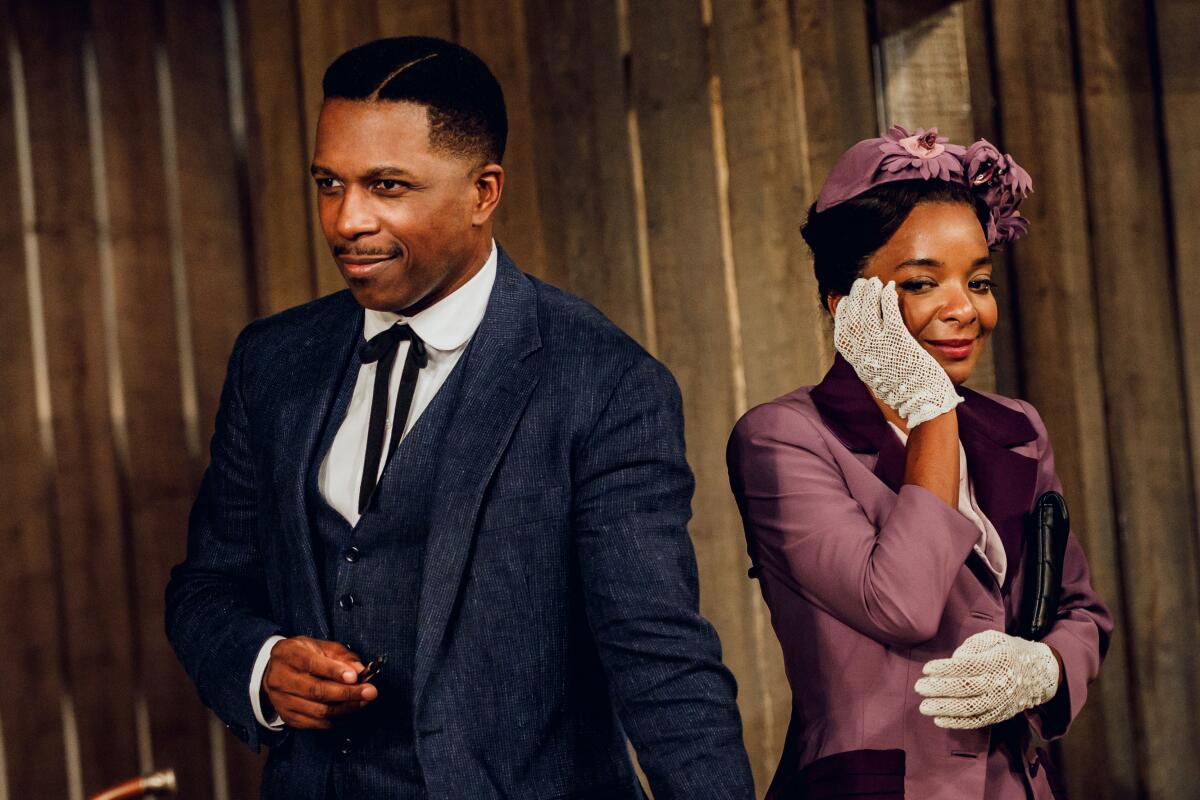
NEW YORK — “Purlie Victorious: A Non-Confederate Romp Through the Cotton Patch,” Ossie Davis’ 1961 satiric farce that was the basis for the 1963 film “Gone Are the Days!” and the 1970 musical “Purlie,” is receiving a vibrant revival on Broadway at the Music Box.
Kenny Leon, who may be the most in-demand Broadway director working today, treats the play as though it were a spry and freshly commissioned new comedy. His production, built for speed and farcical flamboyance, threatens to spin out of control but keeps its eye on the prize of social justice.
Something unexpected happens at the climax of this romp. Laughter over the happy, crackpot resolution is accompanied by a shower of tears. These are smiling tears. There’s joy in seeing right win out over racist might, but there’s also sorrow in how close a call it turned out to be.
Leslie Odom Jr., who won a Tony for originating the role of Aaron Burr in the musical “Hamilton,” plays Purlie Victorious Judson, an itinerant preacher with a con man’s bravado. He’s returned to the plantation where his brother, Gitlow Judson (Billy Eugene Jones), still works, determined to usher in a new era.
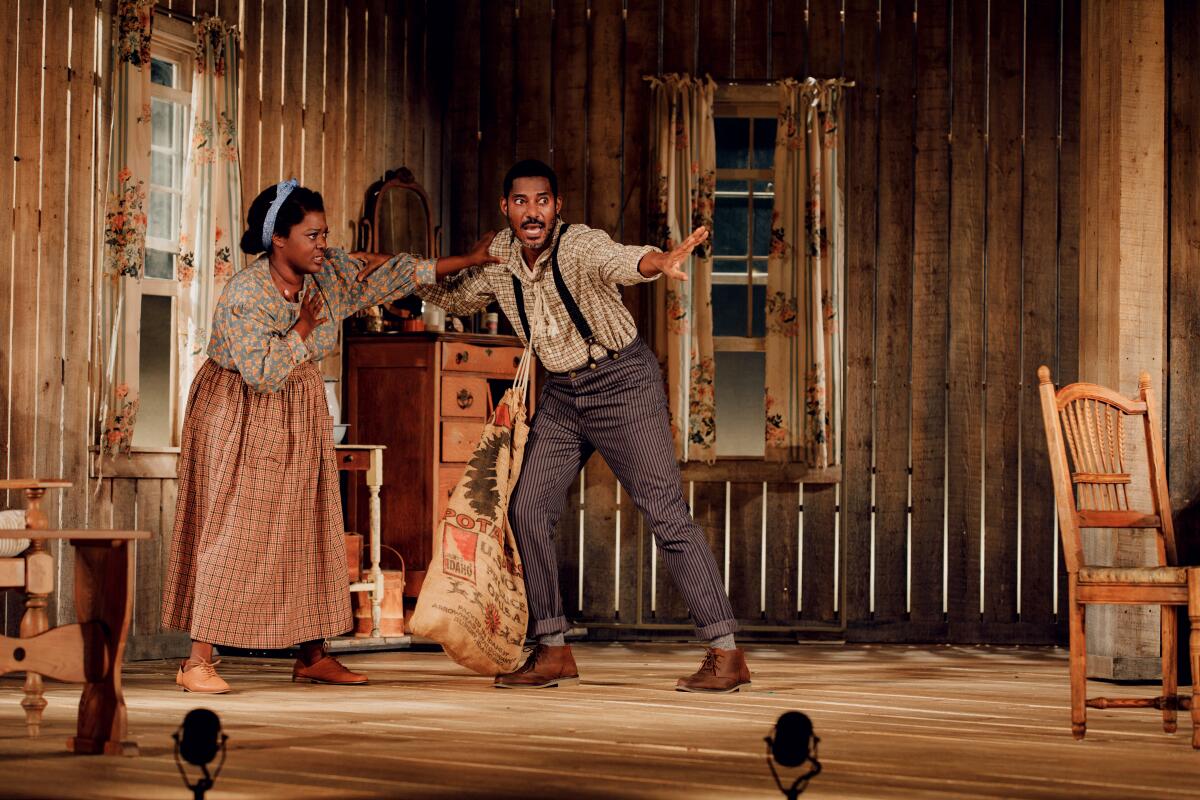
Purlie is on a mission to reclaim Big Bethel, the hometown church that was taken from his people. His scheme is to buy it back by claiming inheritance money owed to a family member, who inconveniently died along with her nearest relation. He wants to stand at the pulpit of his ancestors and preach the sermon of freedom. To that noble end, he has cooked up a shady ruse involving a young woman he met while preaching in Alabama.
Impressionable Lutiebelle Gussie Mae Jenkins (Kara Young) was transfixed by Purlie’s religious charisma. She packed a suitcase and followed him to Georgia, too infatuated to realize the dangers awaiting her.
Purlie intends to pass Lutiebelle off as his dead cousin to Ol’ Cap’n Cotchipee (Jay O. Sanders), the belligerent owner of the plantation. A formidable antagonist with a hair-trigger temper, Cotchipee proudly calls himself a Confederate and seems not to have noticed that the 19th century has long yielded to the 20th.
Missy (Heather Alicia Sims), Gitlow’s wife, points out that Lutiebelle doesn’t look anything like this dead cousin, but Purlie won’t be deterred. “What’s the difference!” he shouts. “White folks can’t tell one of us from another by the head!”
Lutiebelle gets cold feet when she finds out that this cousin went to college. “Why, I ain’t never even been near a college!,” she says, after trying furtively to sneak away with her suitcase.
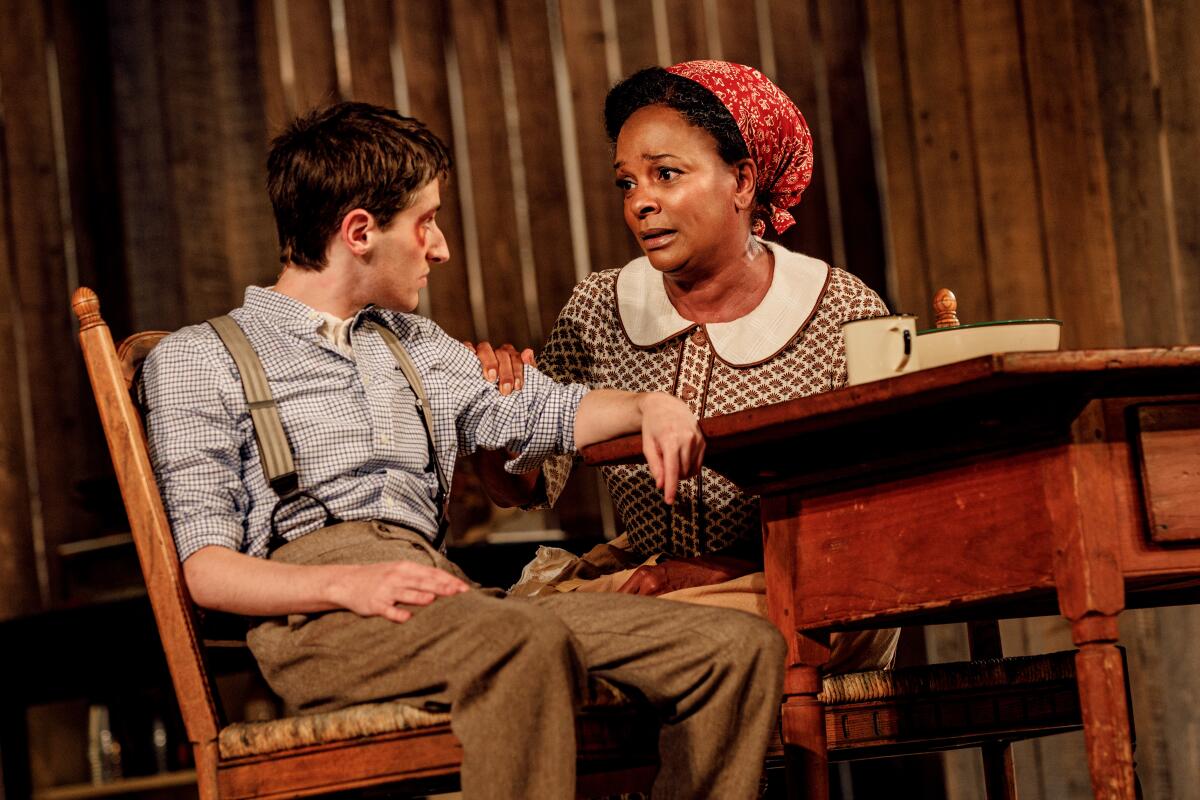
Davis, who originated the role of Purlie in the Broadway premiere opposite his wife, Ruby Dee, who played Lutiebelle, sets up the situation with mathematical precision. Farce is a feat of theatrical engineering, and Leon clears the way so that the play can run at top speed as it shifts from vaudeville to melodrama to antic minstrelsy before returning to high-octane romp.
There’s no intermission, and the attractive and easily transformable wooden shack set by Derek McLane lends the production an unencumbered sleekness. The actors, who enter at fever pitch (and somewhat blurry diction), accelerate to levels that are a thrill to behold.
Odom’s Purlie speaks with the salesman-like rapidity of a preacher who fears he might lose his fickle congregation at any moment. He has reason to be nervous. Gitlow, recently promoted by Cotchipee to the dubious role of deputy of the Black plantation workers, doesn’t think Purlie has a chance in hell of pulling off his plan.
Missy is on board, but she’s confused by her brother-in-law’s religious transformation. Last time he was back, Purlie had declared himself “a professor of Negro Philosophy.” He’s still basically that, but he hopes Big Bethel will be his future lecture hall.
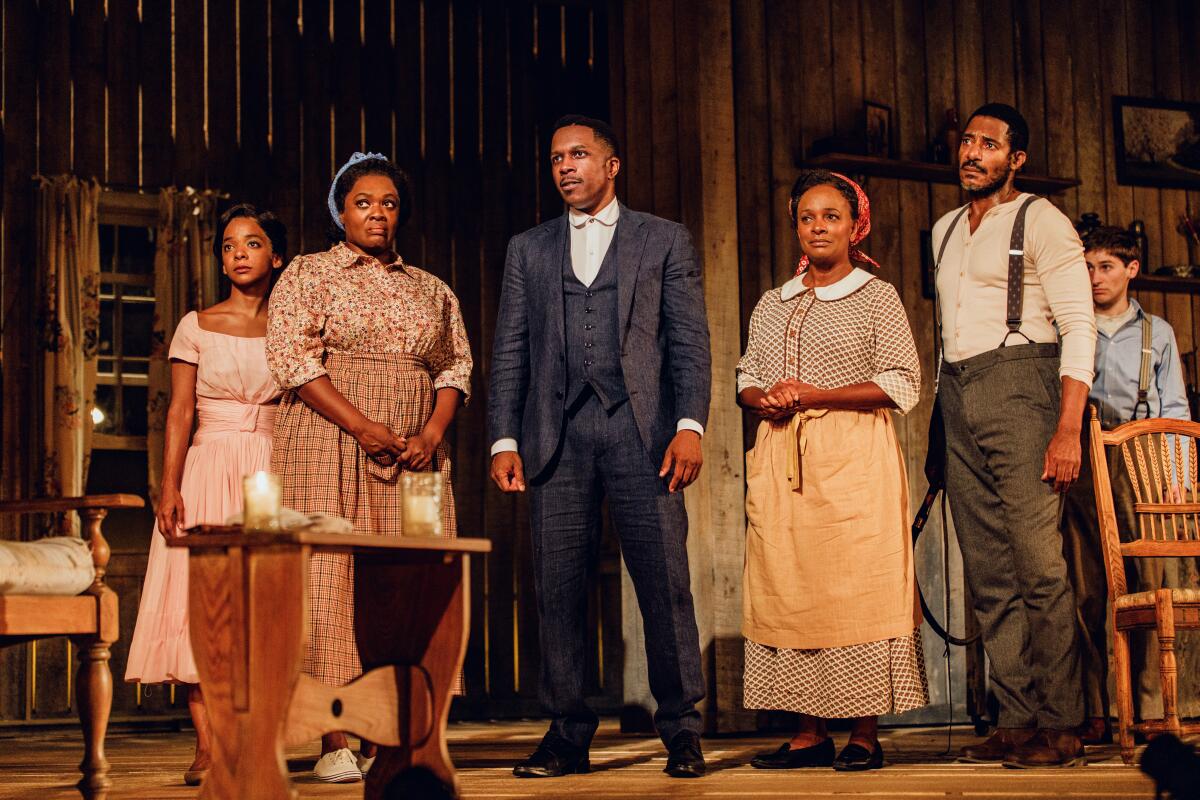
Purlie has a con artist’s cheek, but he’s trying to swindle on behalf of his community. His goal is to restore what’s been unfairly plundered by the white man. All he needs is for everyone to stay in line with the script he’s still working out on the fly.
Sanders, who was an Uncle Vanya for our time, sinks his teeth into the thunderous villainy of Cotchipee. He plays a cartoon ogre who is also a historical reality — the humor of the portrayal only intensifying the threat of a character who whipped Purlie 20 years and would love an excuse to do it again.
Purlie has allies in this fight beyond his family and Lutiebelle. Idella Landy (Vanessa Bell Calloway), a Black servant in Cotchipee’s household, and young Charlie (Noah Robbins), Cotchipee’s string bean of a son (a role originated by a still-boyish Alan Alda), are working undercover on the side of justice. Cotchipee suspects that Idella is filling his boy’s head with “integrationary ideas,” but he tempers his fury out of concern that she might stop cooking for him.
The confrontation between Young’s Lutiebelle and Sanders’ Cotchipee is the production’s pièce de résistance. Her stylized, full-body performance throws caution to the wind and casts a spell of hilarity over the audience.
Caught between the maniacal determination of Purlie and the tyrannous wrath of Cotchipee, Lutiebelle discovers wiles she never knew she possessed. Purlie can’t help but fall in love with her, even as his plan seems to go up in smoke when Cotchipee demands Lutiebelle sign her name for the inheritance and she forgets who she’s supposed to be impersonating.
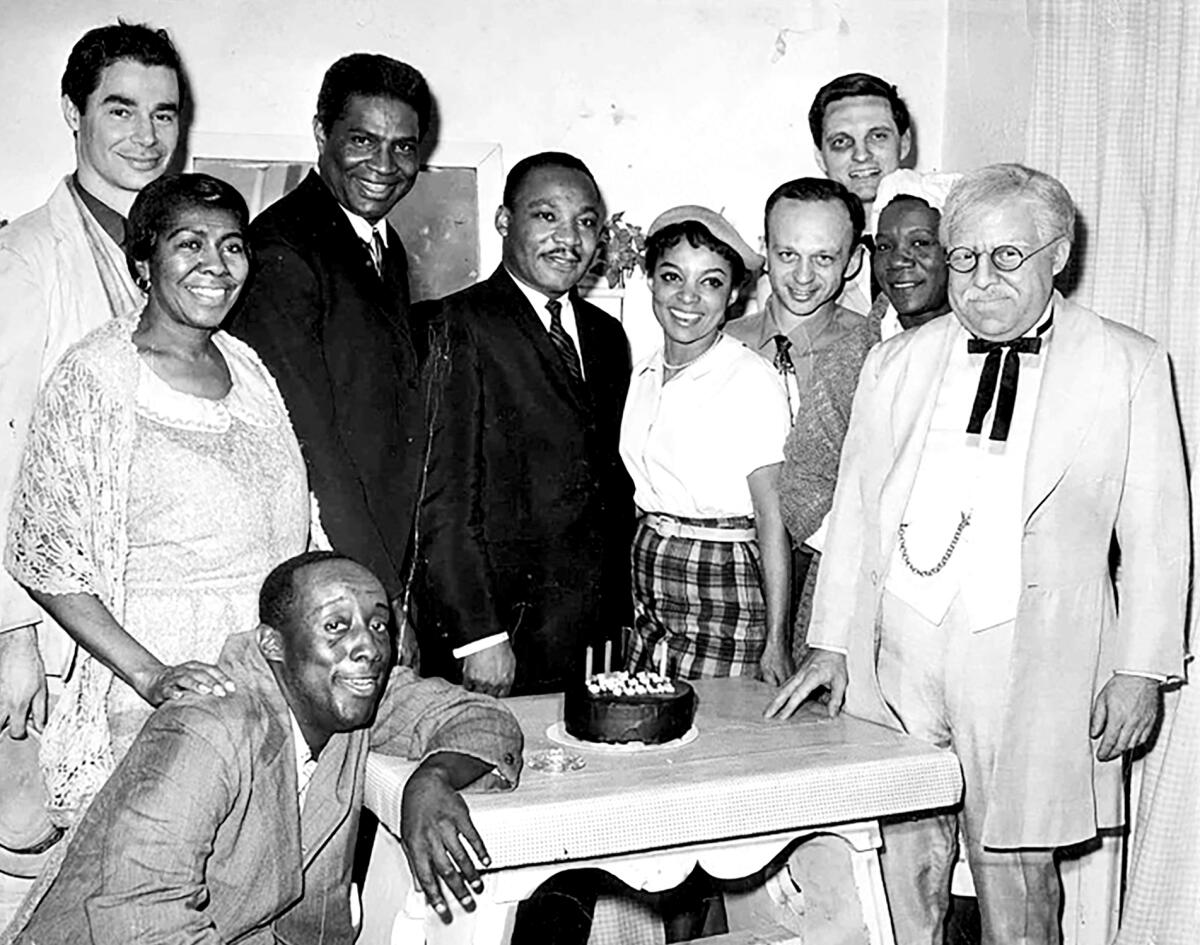
That things turn out in the end is a credit to Charlie being such a good student of Idella’s teaching. But it’s also a function of a farce with a living conscience. Davis concluded the play as he hoped the world might one day be — equitable, welcoming, kind.
The Rev. Martin Luther King Jr. attended the original Broadway production’s 100th performance and took a photo with the cast after the show. Broadway, then and now, reminds us of just how long the arc of the moral universe can be as it bends all too slowly toward justice.
More to Read
The biggest entertainment stories
Get our big stories about Hollywood, film, television, music, arts, culture and more right in your inbox as soon as they publish.
You may occasionally receive promotional content from the Los Angeles Times.











